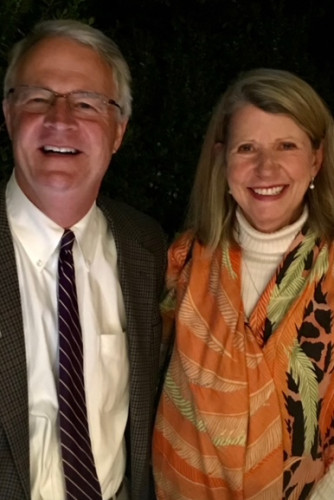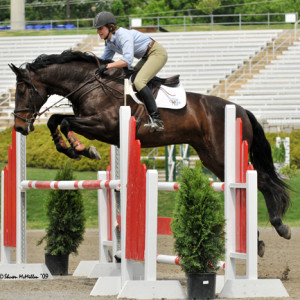"The more I learn about Sewanee, the more interested I am in giving money to the things I believe need support."
 Joanne Boyd, C'77, with former Sewanee
Joanne Boyd, C'77, with former SewaneeWhen Joanne Boyd, C’77, moved into Cleveland Hall in the fall of 1973, Sewanee was still progressing as a co-ed institution. Only four years earlier, the University had started admitting women, and as Boyd describes, there were still rows of urinals in the women’s bathrooms. Additionally, there were no sororities, and Sewanee provided sparse options for women’s athletics. “At the time, the only sports available for women were gymnastics, synchronized swimming, and horseback riding—but you had to pay a fee for riding,” Boyd recalls, adding that tennis and field hockey may have been offered as club sports. She says that she and her female classmates learned to create their own fun: “a valuable tool for a lifetime.”
Boyd came to the Mountain from Birmingham, AL, where she attended Brooke Hill School (now Altamont School), a private college preparatory school for women. “I spent a lot of my childhood and teen years showing horses,” she says. “My family had a farm about 30 miles out of town, and that’s where I spent all my weekends. I would ride six to eight horses every day. At age 12, I won my first national championship.” Brooke Hill’s headmistress took note of Boyd’s hobby and worried it would distract from academics. She prohibited Boyd from missing any classes for horse shows unless the young equestrian was first in her class. “That’s the best thing anyone has ever done for me, because it made me organize my time and work hard in school,” Boyd says.
When Sewanee went co-ed, Boyd shares, “Every girl in Brooke Hill wanted to go there.” She visited the campus in the summer of 1972 and applied early decision, drawn to the University’s academic reputation, traditions, small classes, strong values, and stately architecture. “Sewanee had everything I wanted,” she says.
Boyd maintained her determined work ethic at Sewanee, though her father would not allow her to join the University’s equestrian program. “He thought horses had played a large part in my life, and, as a college student, I needed to try something else,” she explains. Setting her sights on becoming a veterinarian, she majored in biology and took the entire premed curriculum, enrolling in five classes each semester. “I had labs three days a week, and we took Saturday classes back then,” she notes. “We worked hard.”
Despite the rigorous pace, Boyd says she enjoyed Sewanee’s co-ed environment. “It was important to the men to be Sewanee gentlemen,” she says, adding that all of her lab partners were men, and “I felt they wanted to hear my thoughts and ideas. They treated me as an equal.”
In late 1973, the University added varsity women’s volleyball to its athletic offerings, and Boyd eagerly joined the team. “I think sports in general are a great mental and physical outlet, especially in a rigorous athletic environment,” she shares. “They’re good for your mind and good for your self-confidence. Team sports teach you that there’s one goal, and that goal isn’t you—it’s the team. Playing on a team sport taught me a lot of things that I didn’t learn riding and competing by myself.” She played on the volleyball team all four years and was team captain during her junior and senior years. In early 1977, her roommate and Marcia McFadden, C’77, started Sewanee’s first sorority, Theta Kappa Pi, and Boyd served as the first social chairperson.
In 2022, Boyd’s interest in Sewanee athletics compelled her to help coordinate the University’s celebration of the 50th anniversary of Title IX—legislation that prevents educational institutions that receive federal financial assistance from discriminating against individuals based on sex. “I had mixed feelings about Title IX until I started reading about it,” she acknowledges. “I’ve never been a person who felt like women needed to get special treatment. I just didn’t want my sport to be treated as less special than others. But when Title IX came through, it changed things dramatically for women’s sports.” Boyd notes that, before Title IX, very little funding was directed to women’s varsity teams at Sewanee, but support improved significantly after the legislation was enacted.
Through her service on Sewanee’s Title IX committee, Boyd was able to connect with a wide range of alumnae who played pioneering roles in Sewanee’s athletic program. “It was so much fun,” she says. “I really enjoyed calling people and talking to them about what Sewanee was like in the mid-seventies—I had forgotten so many details.” She adds that it was rewarding to bond over shared values. “I never cease to be amazed by how much I have in common with anybody who went to Sewanee, even if they didn’t attend while I was there,” she says. “I think Sewanee teaches values and critical thinking. Integrity and honesty are core values at Sewanee, and I believe Sewanee students are more open to listening to people’s ideas.”
Boyd says she’s proud to champion the University as a class agent, and she previously served on the Alumni Executive Board for four years as Vice President for Reunions. She has also provided regular financial gifts since her graduation. Recently, she established a planned gift of IRA assets, which she has designated for Sewanee women’s athletics. She says she chose this designation primarily because she thinks the University’s Title IX celebration went beautifully, but she enjoyed all sports during her time at Sewanee and attended most of the University’s men’s football and basketball games.
Allison Cardwell, Sewanee’s Director of Gift & Estate Planning, notes that a gift of retirement assets provides a great opportunity to the University while offering a tax benefit to the donor. “Joanne has enriched the Sewanee family in innumerable ways, and her generous planned gift adds to her legacy,” Cardwell says.
During her senior year at Sewanee, Boyd shifted her aspirations from veterinary school to law school because she thought a law degree gave her more career options. Still, she notes, “I do not know that I made the right choice. We had no Career Services department during my time at Sewanee, and I honestly think it would have been a better choice for me to pursue a career in medicine or research, after taking so many biology, chemistry, and physics courses and spending so much time in labs. I’m jealous of all the internships and career advice available to Sewanee students now.”
After graduating from Sewanee magna cum laude and as a member of Phi Beta Kappa, Boyd attended the University of Alabama School of Law. After clerking for a federal judge, she practiced in corporate, securities, and tax fields and served as general counsel for two public companies. In 1997 she received a Master’s in law degree (LLM) in environmental and energy law from Tulane University. For 23 years she has served as principal attorney in her own law practice, specializing in environmental law. She says she would love to teach a course in environmental law at Sewanee.

Through various forks in her career path, Boyd has maintained her enthusiasm for riding and her compassion for animals. She has won two circuit championships in show jumping at the prestigious Winter Equestrian Festival in Wellington, FL—and over the last 27 years, she has rescued and rehomed more than 350 dogs. Additionally, Boyd is the Alabama representative for the Animal Legal Defense Fund, and she has done undercover research for the Greater Birmingham Humane Society, ensuring that local animal shelters are safe and lawful.
She also makes it a point to stay up-to-date on Sewanee life. “The more I learn about Sewanee, the more interested I am in giving money to the things I believe need support,” she says, adding that she always makes new friends when she returns to the Mountain for reunions. “I think Sewanee is just a special place.”

